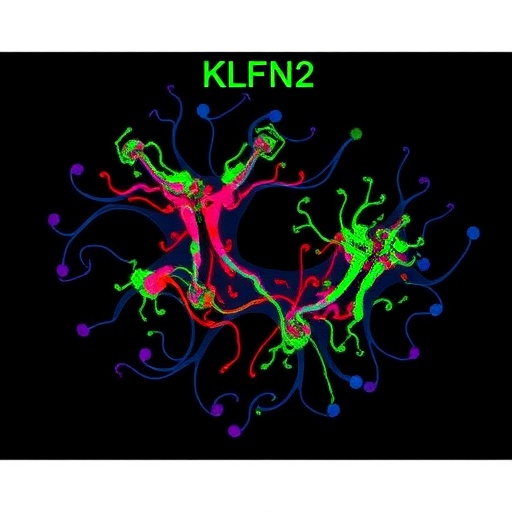A groundbreaking study published in the Journal of Translational Medicine has unveiled critical insights into the molecular mechanisms driving lung adenocarcinoma metastasis. Conducted by a team of prominent researchers, including Zhang, Wang, and Yang, the study centers around the protein KLF5 and its regulatory role in the epithelial-mesenchymal transition (EMT) pathway through a novel interaction with RHPN2. This research highlights a significant advancement in understanding how cancer cells disseminate, potentially opening new avenues for therapeutic interventions targeting metastasis in lung cancer.
Lung adenocarcinoma, a subtype of non-small cell lung cancer, has seen increasing incidence rates globally and poses substantial treatment challenges due to its propensity to metastasize. The complexity of tumor biology and the molecular intricacies associated with the metastatic process render it essential to unravel the underlying mechanisms of these transformations. The study under discussion presents compelling evidence that KLF5, a member of the Krüppel-like factor family of transcription factors, plays a pivotal role in facilitating this process.
At the heart of KLF5’s mechanism is its involvement in regulating EMT, a biological process where epithelial cells acquire mesenchymal properties, leading to enhanced migratory and invasive capabilities. The dysregulation of EMT is recognized as a vital step in cancer progression, and the findings of this study underscore KLF5’s critical function as a transcriptional regulator that influences the expression of genes associated with this transition. Through extensive experimentation, the researchers established that KLF5 expression correlates with increased EMT markers in lung adenocarcinoma cells.
The novel interaction between KLF5 and RHPN2 is particularly intriguing, given RHPN2’s relatively less understood role in cancer biology. RHPN2, or Rhophilin 2, is known to be involved in regulating cellular signaling pathways that impact cellular morphology and migration. This study elucidates how KLF5 indirectly modulates EMT by influencing the expression of RHPN2, thereby creating a regulatory axis that could be vital for enhancing the invasive potential of lung adenocarcinoma cells.
Through a series of detailed experiments, including in vitro cell migration assays and in vivo metastasis models, the researchers demonstrated that silencing KLF5 led to decreased expression of RHPN2 and subsequently reduced cellular migratory capabilities. Conversely, overexpression of KLF5 amplified RHPN2 levels, resulting in increased invasiveness. These findings establish a functional link between KLF5 and RHPN2 in promoting the metastatic phenotype in lung adenocarcinoma, emphasizing the potential for targeting this axis in clinical settings.
Additionally, the study also investigates the downstream signaling pathways affected by KLF5 overexpression and RHPN2 activity. The researchers evaluated key pathways such as the Wnt, Notch, and TGF-β signaling pathways, all of which have well-established roles in regulating EMT and cancer progression. Their findings revealed that KLF5’s influence on RHPN2 expression is mediated, in part, by these pathways, creating a complex interplay that further dictates the metastatic behavior of lung cancer cells.
As the study delves deeper into the implications of the KLF5-RHPN2 axis, it raises poignant questions about potential therapeutic avenues. Targeting KLF5 directly may pose challenges due to its multifunctional nature, but strategies aimed at modulating RHPN2 expression or its downstream signaling effects could prove beneficial. The development of small-molecule inhibitors or monoclonal antibodies targeting RHPN2 presents an exciting frontier for lung cancer treatment, especially for patients with metastatic disease.
Moreover, the study’s findings initiate a broader dialogue regarding the personalization of cancer therapies. Understanding the specific molecular drivers behind a patient’s cancer can significantly impact therapeutic decisions. As clinicians begin to integrate such molecular insights into treatment algorithms, individual variability in KLF5 and RHPN2 expression may guide more effective and targeted interventions.
Addressing the clinical relevance of these discoveries, this research holds promise for improving outcomes in lung adenocarcinoma patients. By identifying KLF5 and RHPN2 as key players in the metastatic cascade, oncologists may be better equipped to design combination therapies that effectively halt the spread of cancer. Furthermore, these insights may also facilitate the development of predictive biomarkers, allowing for the stratification of patients based on their risk of metastasis.
The implications of this study extend beyond lung cancer; a better understanding of KLF5 and RHPN2 may provide insights into other cancer types characterized by aggressive metastatic behavior. As ongoing research strives to unravel the complex molecular landscape of cancer, findings such as these will be invaluable in guiding future investigations.
In summary, the work by Zhang, Wang, and Yang presents a significant stride in cancer research, elucidating the role of KLF5 in the advancing metastatic cascade of lung adenocarcinoma through its interaction with RHPN2. As the scientific community continues to dissect the nuances of cancer biology, this study serves as a crucial reminder of the potential for innovative therapeutic strategies rooted in molecular understanding.
The findings underscore the importance of continuous research in cancer-related biology to address the growing burden of metastatic disease. Through collaborative efforts among scientists, clinicians, and pharmaceutical companies, the tools needed to combat cancer’s most aggressive manifestations are steadily being developed, offering hope for patients worldwide.
As we look to the future, the interplay between transcription factors like KLF5 and cellular signaling pathways will undoubtedly remain a focal point in cancer research. The journey of translating scientific discoveries into clinical realities is fraught with challenges, but with each study, including this one, we inch closer to effective interventions that can significantly alter the course of lung adenocarcinoma and potentially other malignant diseases.
Subject of Research: Lung adenocarcinoma metastasis, role of KLF5 and RHPN2 in epithelial-mesenchymal transition.
Article Title: KLF5 facilitates lung adenocarcinoma metastasis by regulating the epithelial-mesenchymal transition pathway through RHPN2.
Article References:
Zhang, T., Wang, Rq., Yang, Yb. et al. KLF5 facilitates lung adenocarcinoma metastasis by regulating the epithelial-mesenchymal transition pathway through RHPN2.
J Transl Med 23, 1078 (2025). https://doi.org/10.1186/s12967-025-07150-6
Image Credits: AI Generated
DOI: 10.1186/s12967-025-07150-6
Keywords: KLF5, RHPN2, lung adenocarcinoma, epithelial-mesenchymal transition, metastasis, cancer research.




